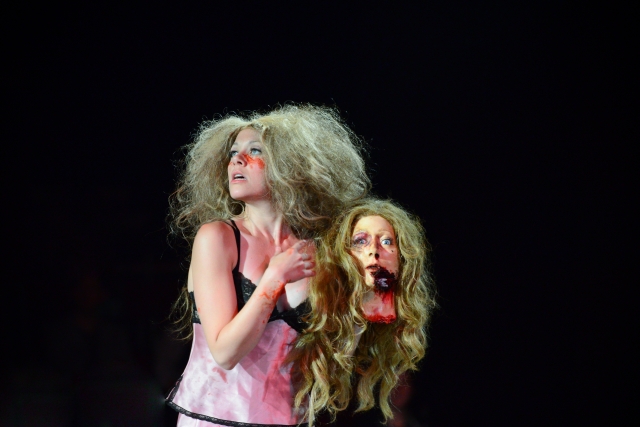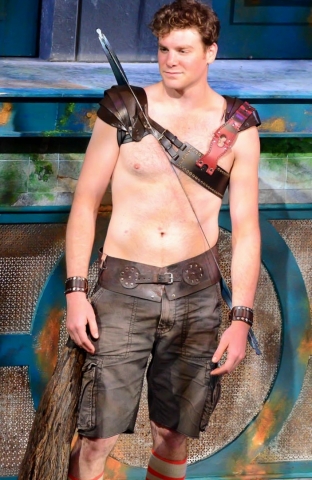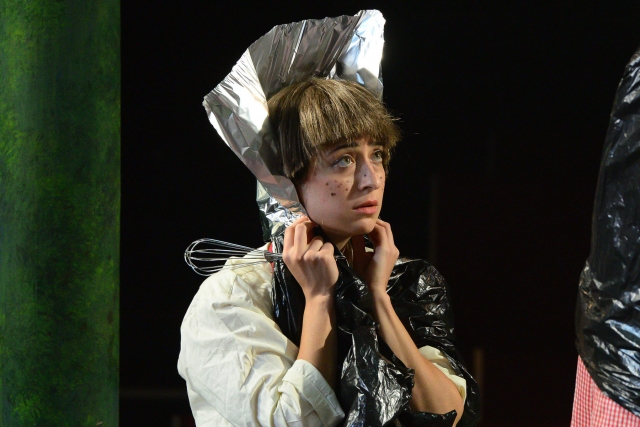All Our Tragic
Written and Directed by Sean Graney
August 10–October 5, 2014
The Hypocrites
The Den Theatre
Chicago, Illinois
Reviewed by Ruth Scodel
The University of Michigan
The program for Sean Gurney's All Our Tragic, a premiere by The Hypocrites at the Den Theater in Chicago, promises:1
The 32 Surviving Greek Tragedies (Aeschylus, Sophocles, Euripides) compiled into a single 12-hour Epic.
Well, not quite. The twelve hours include several breaks, so the actual running time is about nine hours. Because the theater provided food, there was a single 12-hour experience, though. The author-director says on the company's webpage:
I want to create a modern Festival of Dionysus, the immersive, durational-theater experience of the Ancient Greeks for which these plays were originally written. These incredible festivals were designed to encourage civic conversation about important contemporary topics by incorporating music, politics and eating.
The food provided was very good but vegetarian (falafel)—not quite a massive public sacrifice. And a small theater is not quite a festival setting. Yet the effect was special, different from a regular night out to see a play, and the audience did come to feel like a community. So as festival, the event was successful.
Graney is not a classical scholar, obviously. It does not matter that he does not seem to know that two of the plays are almost certainly not by the Big Three. "Compiled," though, is not the right word for what he has created. Some tragedies are recognizable although they have been compressed: Trachiniae, Philoctetes, Sophocles' Electra. I recognized very few lines (the opening of Trachiniae), and thought that there were lost opportunities to use the actual texts. Some plays have been radically transformed: the Danaids become seven sisters (the two youngest, Helen and Klytemnestra, are said to be babies), four of whom kill their would-be husbands, Kyklopes, sons of Eurystheus the Necromancer, with umbrellas given them by Herakles. The relation of some of the tragedies to this production reminded me of the old joke about waving a bottle of vermouth over your gin and calling it a martini. "Cousin Dolon" rushes off to spy on the newly-arrived Greeks, and the return of his wolfskin proves his death: so much for the Rhesus. A chained Prometheus repeatedly rejects Herakles' offers of rescue, because this idiot cannot be the hero whom Prometheus knows will come; the Prometheus we know is already over. Herakles destroys Troy to protect it from Xerxes—so much for Persians. But, of course, I was surely the only member of the audience ticking off the titles as the motifs went by. The presiding spirit was Ovid's, rather than that of any Greek poet, as the play turns the tragic corpus (along with the Iliad and some other interpolations for continuity) into a carmen perpetuum that moves between humor and pathos at alarming speed. There are no gods, although there are prophecies and magical potions, while Aigeus (more prominent than he is in extant tragedy) is literally a goat-man.
It was difficult by the end of the evening to remember exactly what had happened in the early afternoon. The entire work is in four parts, Physics, Politics, Patriotics, and Poetics. Physics includes Herakles and Medea. Politics is set at Thebes, with vicious operators in power suits, including Agave and Jokasta. Ancient gender norms are not relevant here—similarly, the pretense that Iphigenia is to marry Achilles is absurd because Achilles, loving Patroclus, is gay. Without gods, the maenads of Bacchae became a women's political movement called "the Foxes," and Tiresias is blinded by Pentheus on stage before Pentheus is killed by a completely sane and calculating Agave. The Trojan War occupies Patriotics, while Poetics represents its aftermath. There is a great deal of blood in this show (63 deaths, according to one review—I did not count), along with considerable amiable silliness: Herakles gets his idea of what a hero is from a pamphlet that looks like a Little Golden Book of Heroes; Deianeira is obsessed with baking. Ion-Haemon carries around a tortoise (I wondered if this idea was stolen from Stoppard's Arcadia, though it could also be a pun on the species Hermann's tortoise); Orestes has a teddy bear named "Bearristophanes."
The Seven Sisters serve as an organizing thread: Asterope, Glauke, Kreusa, Alkestis, Klytemnestra, and Helen, and I think Agave. Their deaths punctuate the day. Various mythological characters are merged—Patroklus becomes a son of Herakles, replacing Hyllus, Philoctetes takes on the role of Iolaus, and Ion, after his recognition, is the son of Creusa the wife of Creon, and so becomes Haemon—all of which helps keeps the number of characters under control. Herakles (whose family is threatened by Eurystheus) is driven mad by a drug poured on him by Eurystheus, and kills two of his legitimate children. One, a girl called "Mouse," given to dancing around while blowing a soap-bubble pipe, survives the attack so that she can die in the adaptation of Heraklidae, while the other is Patroklus. The composites and compressions were only occasionally bothersome (I felt a certain distress at Theseus’ reluctance to accept Oedipus at Athens, but he had no chorus to take on the task). Even with the composites, 51 named characters are played by fourteen actors, along with the three Odd-Jobs and six "Neo-Titans" (who play the Kyklopes, Polynices' ragtag army, and warriors at Troy). Odysseus and Tiresias were both female (Tiresias once had a relationship with Creon, who abandoned her). The cast, the lighting, and the costuming all won my highest respect.
In Helen, Menelaus was confronted with the Helen he has brought from Troy and a duplicate who claims that her double is the witch Theonoe, and neither he nor the audience has any way to know which is the real Helen. He kills one of them (I think it was the Trojan Helen), and the remaining Helen carries her head around until she herself is killed (after she is not transported to heaven as she expects in what is left of Orestes). The genuine doubt about which Helen is real is very effective; I was not so sure about the severed head, and in the godless world of this show Helen's expectation of apotheosis did not make much sense. I do not know how this confusion would be interpreted by viewers who do not know the Orestes (almost all of them—some audience members had done quick reviews of mythology in advance, but I doubt that it was much help).
Each of the eight acts begins with the entrance of the Odd-Jobs—Alice, Sophie, and Elsie—who are a chorus and perhaps Muses. They sing, mostly folk songs and a bit of opera—the show begins with "Long, Long Ago" and ends with "Hard Times Comes Again No More”—with great charm, along with announcing what year we have reached in the story (it covers 75 years) and how long each intermission will be. Each act opens as one of the characters declares "I love this time of day" and claims that the light provides a sense of oneness with the world, although that tranquility does not last.
Sometimes the format is generous to the characters. Antigone and Orestes especially benefit from the time to develop and are deeply moving. The Clytemnestra of this version cancels her murder plan until it turns out that Cassandra is pregnant and Agamemnon plans to name her baby "Iphigenia." The change allowed the sequel to follow mainly Sophocles while presenting a more Euripidean Clytemnestra. This all worked very well. Other moves left me mystified. Hermione, a pretty airhead in pink, is unwillingly married to Neoptolemus, becoming his partner in a therapeutic-recreational Trojan War re-enactment center where she plays Polyxena and is contented, not wanting to be rescued by Orestes; the two characters, played by the same actress, seem to have merged. I was confused to see Orestes kill Neoptolemus and then Neoptolemus leave with Hermione; perhaps, because he has become an actor of his past, he exists in a theatrical world in which death is only temporary.
The piece indulges in considerable humor (Physics is mostly mythological burlesque). I suspect there were pop-cultural jokes that I missed; my favorite bit of actual allusion was the mute Pylades—there was a nice running gag in which characters other than Orestes forget Pylades' existence—a wonderfully creepy figure who reminded me of Lurch on The Addams Family. In one respect, though, the show is ideologically bent to gloom: the happy endings are all removed, and so are most of the edifying moments. There are no noble Euripidean self-sacrifices, and Iphigenia is killed before she can finish her patriotic speech. Alkestis is brought back to life as Mormo, with snake hair. Orestes is the only survivor of this version of IT. Not only are Pylades and Iphigenia ground up as bat food, but Menelaus drops by to share the same fate. On the other side, the characters share sympathies over their divides: Antigone and Creon have a genuine conversation as she stands in the grave she has dug (before he bashes her over the head with the shovel and pushes her in), and the play ends with a tender meeting between Orestes and (the ghost of?) his mother. The general message seems to be kindness and forgiveness, and I am not about to argue with it.
I certainly hope nobody in the audience mistakes this play for a Greek tragedy or tragedies, but it does demonstrate the theatrical energy that the texts and their cultural prestige can generate. And it was a great way to spend a day.
notes
1 Editor's notes: Daniel Smith reviews the same production in Number 3 of this volume. A remount of the production is planned for next summer during June 20–August 9, 2015.



